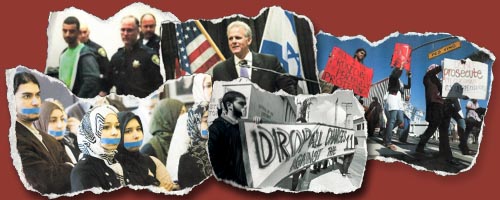|
|
What is freedom of speech? Does freedom of speech exist? Should there be limits placed on freedom of speech? What is the proper relationship between freedom of speech and civility? What happens when two groups’ right to freedom of speech collide?
Recent events at UC Irvine provoke us to ask these questions
On February 8, 2010, 11 students were arrested at UC Irvine for disrupting a speech by the Israeli Ambassador Michael Oren. Eight UC Irvine and three UC Riverside students stood up and interrupted Oren’s speech, saying “Mr. Oren, propagating murder is not an expression of free speech” and “Israel is guilty of 101 war crimes.” UC Irvine suspended the Muslim Student Union on September 2, 2010 and on February 7, 2011 the Orange County District Attorney charged the students, who became known as the Irvine 11, with two misdemeanors. The trial remains ongoing.
Both sides claim they acted in defense of civility and freedom of speech.
The UC Irvine administration contends Michael Oren had a right to speak uninterrupted. According to the administration, the protesting students acted with disrespect and incivility.
UC Irvine Chancellor Michael Drake, in a letter to the UC Regents, defended Michael Oren’s right to speak uninterrupted. Drake called the student’s behavior “intolerable” and argued that “a great university depends on the free exchange of ideas.” The District Attorney agreed, claiming “we cannot tolerate a preplanned violation of the law, even if the crime takes place on a university campus.”
The UCI and UCR students argue they were peacefully protesting a speaker who they believed had participated in war crimes. A spokesperson for the Irvine 11 explains the students were protesting Israel’s 22-day bombing campaign into the Gaza strip that began on December 27, 2008. These students saw it as their civil duty to disrupt the controversial speaker. For them, interrupting the talk was an expression of their first amendment rights. A spokesman for the Council on American-Islamic Relations defended the Irvine 11, “civil protest against government abuses is a time honored tradition that has led to the end of apartheid and the birth of civil rights.”
The incident evokes discussions over freedom of speech, campus community, and how, or whether civility should, be maintained amidst the most controversial topics.
The university campus is a place that teaches, cultivates, and encourages the exploration of ideas. But how should the university handle controversial issues, such as the Israel/Palestine conflict? Was the university correct in arresting the eleven students? Additionally, some Orange County residents have expressed frustration that the trial is costing too much money in a depressed economy. Others contend that this incident is another example of Islamaphobia and that the students charged with misdemeanors are being treaty too harshly. The incident also forces us to consider what is the appropriate form of protest. Should protesting students hold a demonstration against a speaker they disagree with, or are more aggressive tactics, such as interrupting a speaker necessary to gain the attention their protest deserves?
It is not always easy to determine where the accusing finger of incivility should point. Is it at the protesters for interrupting a speaker? Is it at the speaker for his past involvement in war crimes? Is it at the university for suspending the Muslim Student Union? Is it at the District Attorney for charging the students with misdemeanors? Of all the three campuses to experience incidents of incivility in 2010, the case of UC Irvine proves the most difficult to assess the acts of incivility and the appropriate campus response.

|





